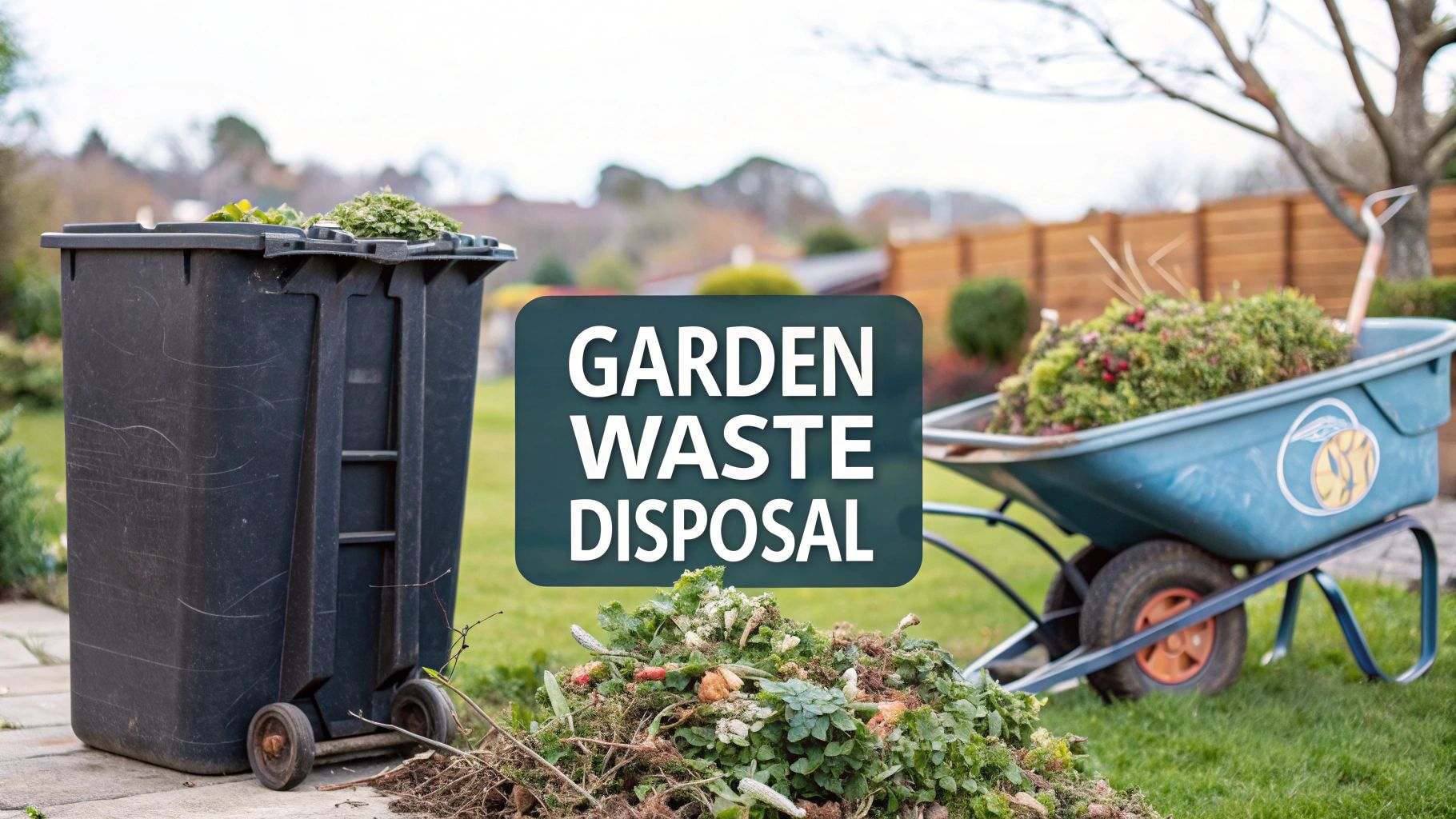Hire a Skip Christchurch – Fast and Reliable Waste Removal
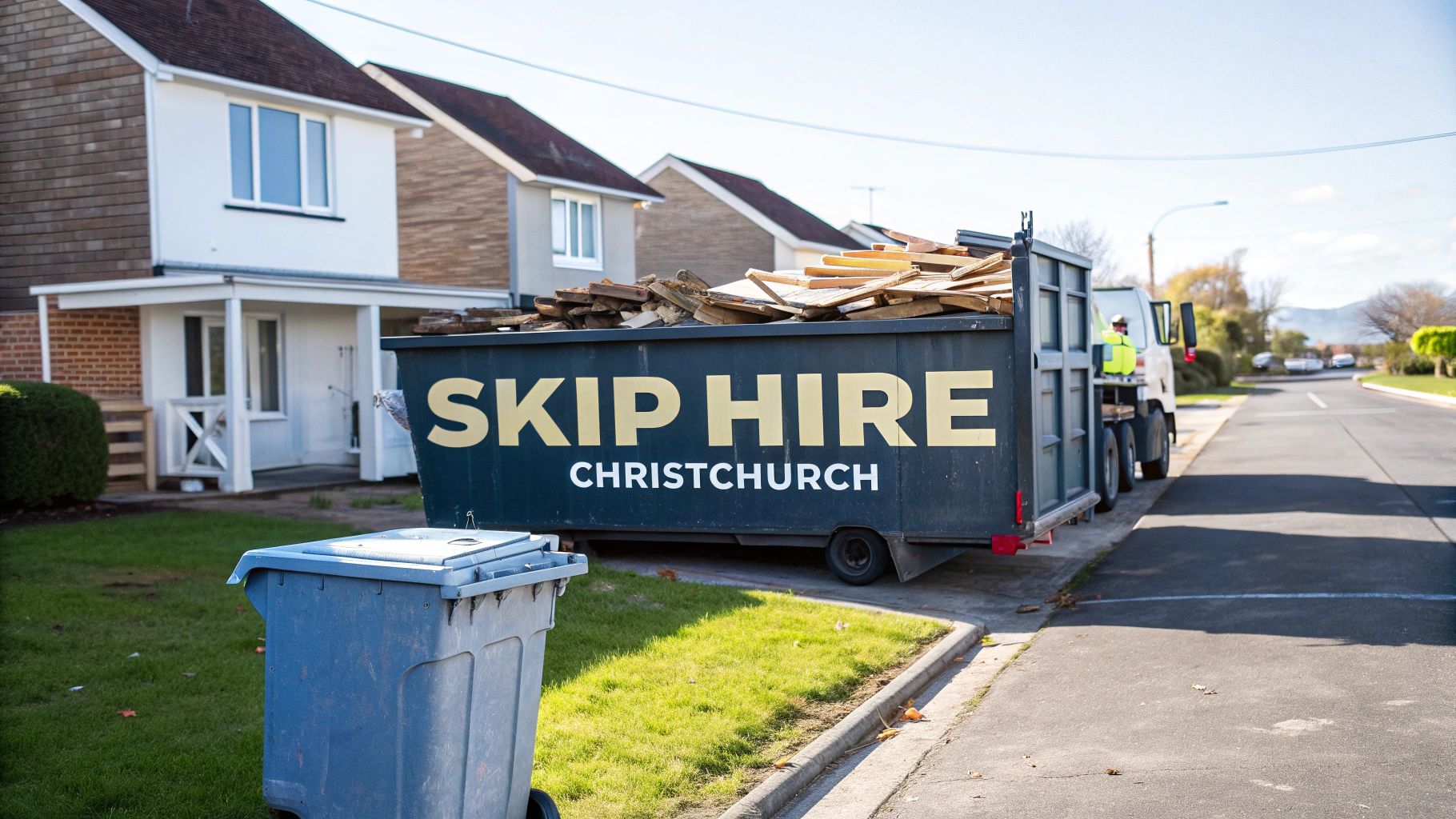
Hire a Skip Christchurch – Fast and Reliable Waste Removal
Got a project on the go in Christchurch and wondering what to do with all the rubbish? For most home renovations, garden clear-ups, or even smaller commercial jobs, the answer is usually pretty simple: hire a skip. This guide will walk you through everything you need to know, making the whole process a breeze.
Why Hiring a Skip is Your Best Choice
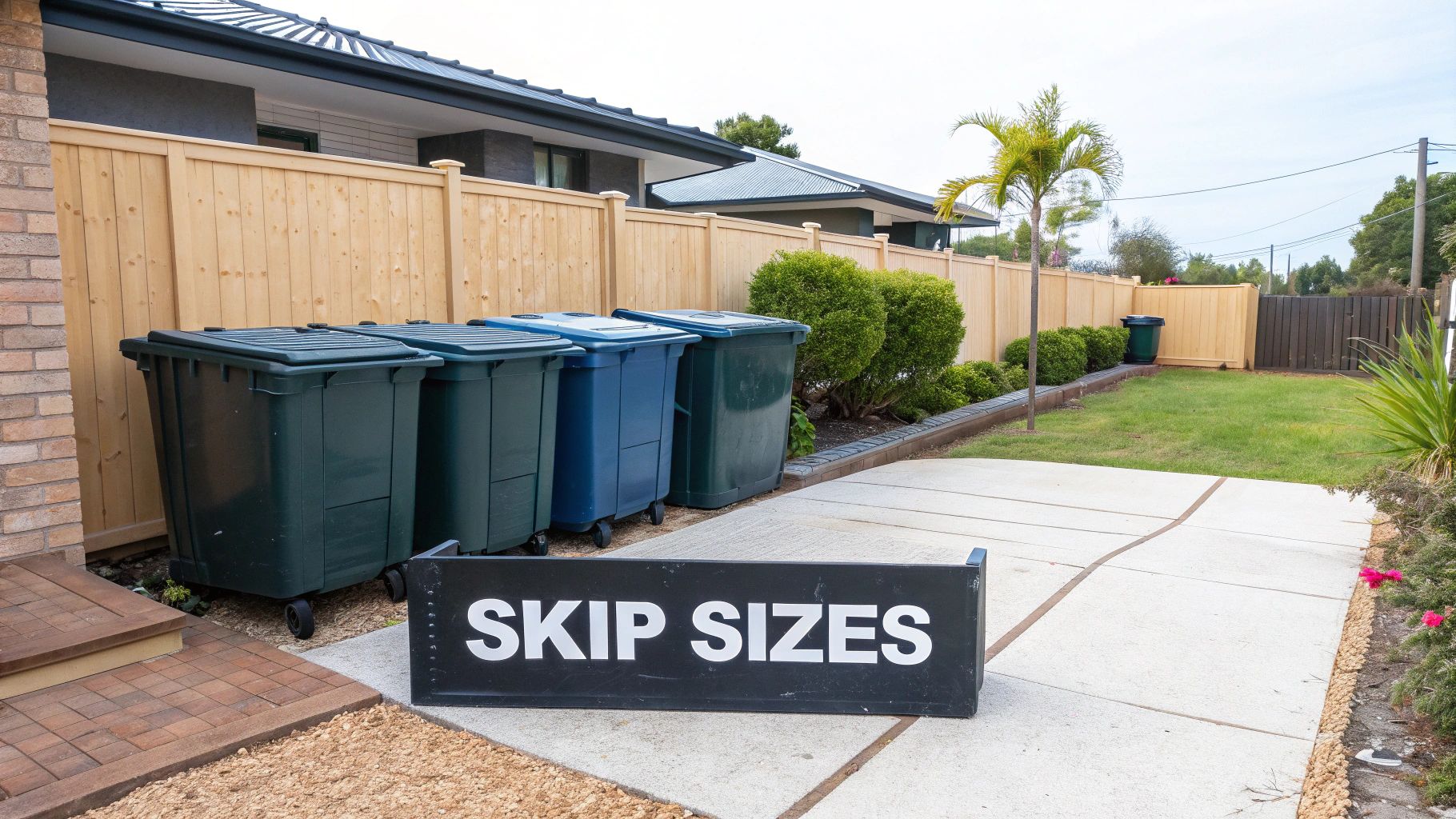
When you're staring down a mountain of debris, getting rid of it efficiently is the key to keeping your project moving. Hiring a skip isn't just about convenience; it's a practical and often cheaper solution than doing countless trips to the local tip. It gives you one central place for all your rubbish, which keeps your site much tidier and safer.
The very first thing to do is get a rough idea of the type and amount of waste you're going to create. Thinking about this early on helps you dodge common headaches, like ordering a skip that’s way too small or paying for a massive one you only half-fill.
Project Type Matters
The kind of job you're doing will have a big impact on your skip hire needs. A weekend garden tidy-up will mostly create green waste, whereas a bathroom renovation will leave you with old tiles, fixtures, and rubble. For bigger undertakings like the custom home building process, planning your waste management right from the start is absolutely crucial for a smooth-running project.
It’s also interesting to see how UK construction trends are playing a part. There's been a clear move towards refurbishment and repair work rather than just new builds. This means the demand for smaller, more versatile skips perfect for home improvement jobs has shot up, making them easier to get hold of than ever before.
Getting your skip hire right doesn't just save you time and money; it's a big part of responsible waste management. By sorting what you throw away, you’re helping to boost recycling rates and reduce what goes into landfill right here in the Christchurch area.
Ultimately, whether you're clearing out the garage, landscaping the garden, or managing a small building site, asking the right questions before you book is key. Have a think about these points:
- Waste Volume: How much rubbish will you actually have? It helps to picture it in terms of wheelie bins or standard bin bags.
- Waste Type: What are you throwing out? Is it general household junk, garden waste, heavy stuff like soil and bricks, or a bit of everything?
- Project Timeline: How long will you need the skip for? A standard hire period is often between 7 and 14 days.
Choosing the Right Skip Size for Your Project in Christchurch
Picking the right skip size when you hire a skip in Christchurch is easily the most important decision you'll make. It’s a classic, and often costly, mistake. Go too small, and you're stuck paying for a second delivery. Go too big, and you're just throwing money away on empty space. The goal is always to nail it on the first try.
Let’s get practical and move past vague terms like 'mini skip' or 'builder's skip'. The real key is to picture what will actually fit inside. A small error in judgement here can easily double your waste disposal bill or bring your project to a grinding halt.
From Garden Tidy-Ups to Full-Scale Renovations
Think about your project in concrete terms. Are you tackling a small bathroom refit? A 4-yard skip is usually spot-on for that kind of job. It can comfortably swallow the equivalent of 30-40 standard bin bags, making short work of old tiles, a toilet, a basin, and the old vanity unit.
Now, if you're ripping out an entire kitchen, you're looking at a whole different level of waste. For a major job like that, an 8-yard skip—what many call a 'builder's skip'—is the industry standard. It has the capacity to handle old worktops, all the cupboards, flooring, and even a few appliances, giving you plenty of room without the stress of needing a second container.
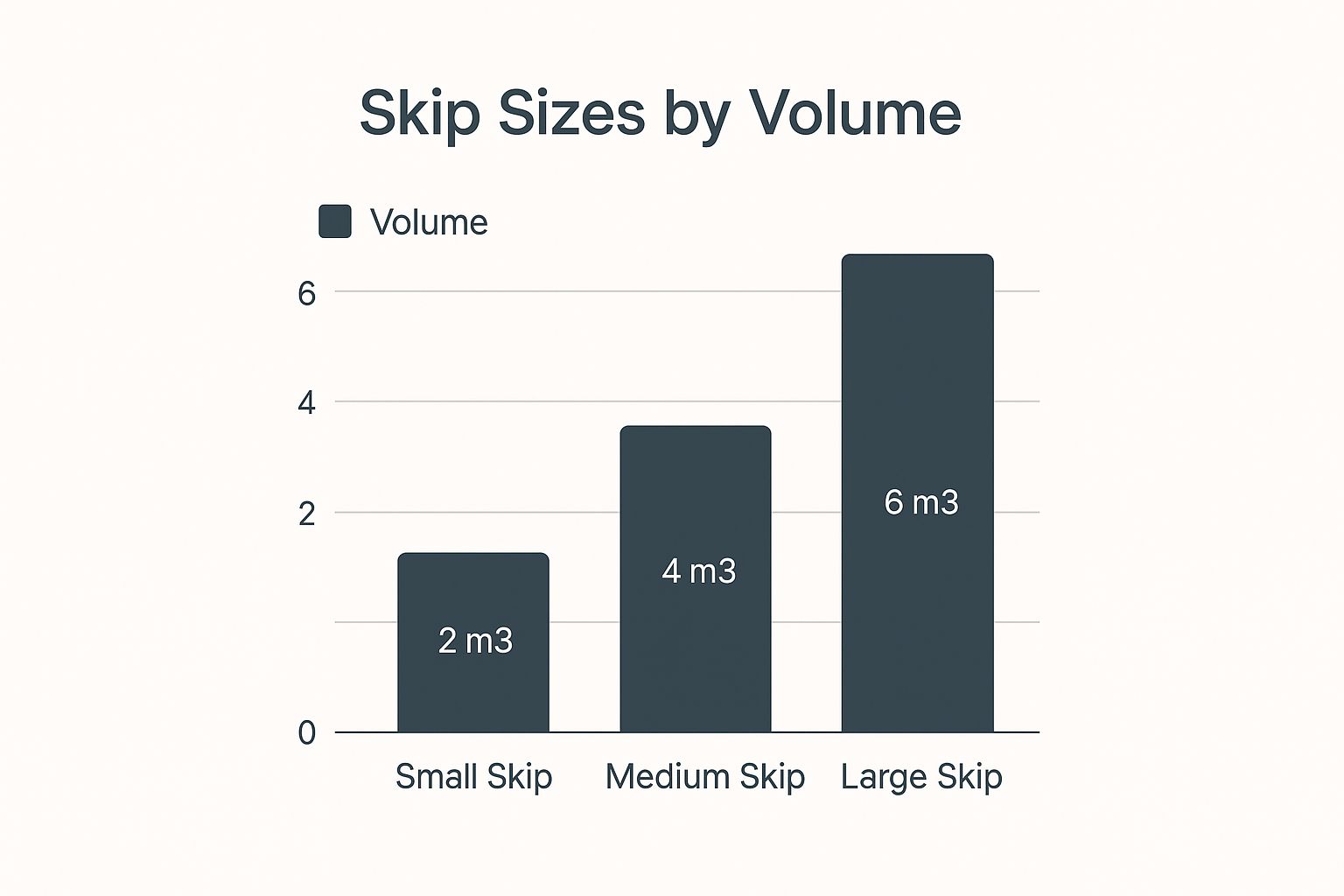
A Quick-Look Guide to Skip Sizes
To make things clearer, here’s a simple table to help you visualise what each skip size can typically handle for common Christchurch projects.
| Christchurch Skip Size Guide What Fits? | ||
|---|---|---|
| Skip Size (Cubic Yards) | Approx. Bin Bags | Ideal For (Christchurch Examples) |
| 2 Yard 'Mini' Skip | 15-20 | Small garden clear-out, single room declutter, minor DIY waste. |
| 4 Yard 'Midi' Skip | 30-40 | Small kitchen or bathroom refit, major garden waste from a larger property. |
| 6 Yard 'Small Builder's' | 50-60 | Bulky waste from house clearances, mixed construction waste, soil and rubble. |
| 8 Yard 'Large Builder's' | 70-80 | Full house clearances, large renovation projects, shop refits. |
Choosing the right size really comes down to accurately picturing your waste pile. This table should give you a much better starting point.
Practical Tips for Estimating Your Waste
Getting your estimate right takes a bit of foresight. Don't just eyeball the items you plan to get rid of; you have to account for the "hidden" waste. For example, when you take down an old wall, you’re not just dealing with plasterboard. There’s the timber frame, insulation, and often a surprising amount of rubble to consider.
Here are a few tricks of the trade to help you gauge your needs:
- The Wheelie Bin Method: A great way to visualise volume is to think in terms of your standard council wheelie bin. A 2-yard skip, for instance, holds roughly the same amount as four of them.
- Measure It Out: For big items like old sofas or a pile of rubble, get the tape measure out. A quick calculation of length x width x height will give you a rough cubic metre volume, which is a much more reliable way to choose.
- Don't Forget the 'Fluff' Factor: Awkwardly shaped items never stack perfectly. There will always be air gaps. A good rule is to allow for 20-30% extra space just for this inefficient packing.
The best piece of advice I can give is to slightly overestimate. While paying for a little bit of empty space might sting, it's almost always cheaper and far less hassle than having to order a second skip halfway through the job.
Still on the fence? For a more detailed breakdown of matching projects to skip sizes, you can learn more about what size skip you might need in our dedicated guide. Getting this first step right is the foundation of a smooth and cost-effective project.
Decoding Skip Hire Costs and Permits
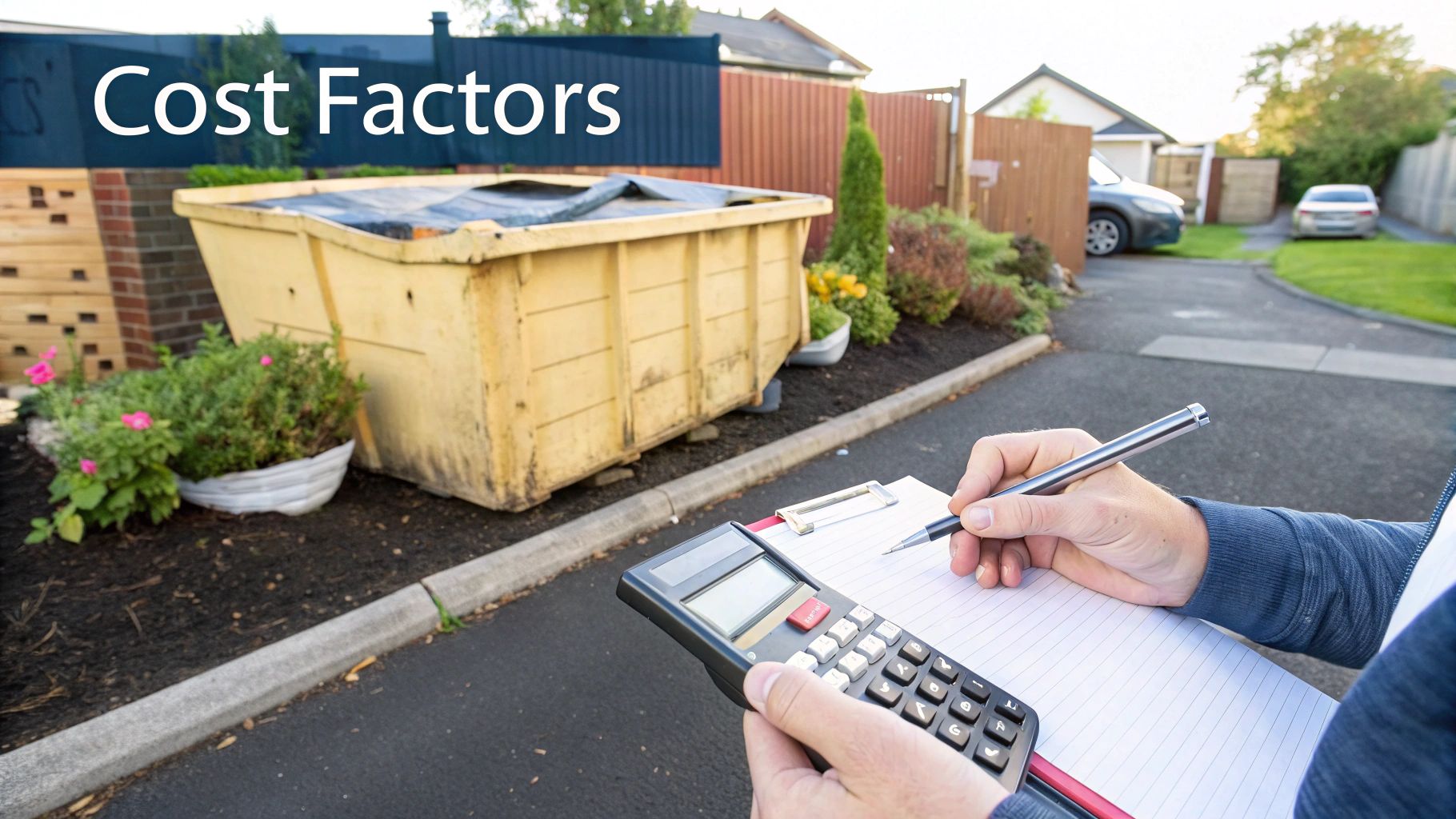
When you hire a skip in Christchurch, the price you’re quoted is more than just a rental fee for a big metal box. It’s a mix of several crucial elements, and knowing what they are can save you from any surprises.
The most obvious factor is the size of the skip; bigger projects mean bigger skips, and that naturally costs more to hire, transport, and process. Your hire duration also matters. Most companies offer a standard period of one to two weeks, but if your job overruns, you'll likely face a daily or weekly extension fee.
And then there's the waste itself. Heavy stuff like soil, concrete, and rubble is far more expensive to handle and haul away than lighter, general waste. That's why it’s so important to be upfront about what you're throwing out right from the start.
The Hidden Costs Behind Your Quote
So, what else goes into that final number? One of the biggest unseen costs is the UK landfill tax. This is a government levy on every bit of waste that ends up in a landfill, designed to push us all towards recycling and better waste management.
As of April 2025, the standard rate for landfill tax shot up to a hefty £126.15 per tonne. To put that in perspective, it's a massive 38% jump in just six years, and that cost has a direct knock-on effect for waste companies. Inevitably, this gets passed on to the customer, meaning it's a big part of the skip hire price you pay.
Remember, the quote you receive already includes these operational costs. A reputable company will be transparent, but it’s helpful to understand that factors like government taxes are a major component of what you're paying for.
Getting your head around these pricing elements helps you budget properly. For a closer look at how these charges vary across the country, our guide on local skip hire prices offers some really useful insights.
Navigating Christchurch Council Permits
Here’s a simple rule of thumb: if the skip is going to be placed entirely on your own private land, like your driveway, you’re all good. No permit needed.
But, if even a small part of it needs to sit on public land – a road, pavement, or verge – then you absolutely must have a council permit.
Trying to get away with placing a skip on a public highway without one is illegal and can lead to some pretty hefty fines. The good news? Your skip hire company will sort out the entire application process for you.
Here’s a quick rundown of what happens:
- The Application: Your provider submits all the details to the Christchurch council, explaining where the skip will be and for how long.
- The Cost: Permit fees differ between councils, but this is always an extra charge on top of your hire cost. It covers the admin and ensures the placement is safe for everyone.
- The Timeline: It can take a few working days to get a permit approved, so don't leave it to the last minute. If you know you need on-road placement, booking well in advance is essential.
A bit of forward planning here goes a long way. It keeps your project on the right side of the law and helps you dodge any stressful—and expensive—delays.
What You Can and Cannot Put in a Skip
Getting your head around what can and can't go in your skip is one of the most important parts of hiring one in Christchurch. Trust me, getting this wrong can lead to some pretty nasty surprises – think extra charges for contamination or even the skip company flat-out refusing to take your waste until you've sorted it out.
The good news? Most of the common stuff from your average home or garden project is totally fine. We're talking general household junk from a big clear-out, green waste like branches and grass cuttings, and even heavy materials like soil, bricks, and concrete from building work.
Essentially, if it’s non-hazardous, you're usually good to go.
Restricted and Prohibited Items to Watch Out For
Where people tend to run into trouble is with items that are classed as hazardous or need special handling because of environmental rules. It’s absolutely vital that these things are kept separate from your general waste.
A simple list is the best way to avoid any mix-ups. Here’s what you cannot put in a standard mixed waste skip, no exceptions:
- Asbestos: This stuff is incredibly dangerous and requires a specialist removal and disposal service. Don't even think about it.
- Plasterboard: While some companies might take this in a dedicated bag, it can never be mixed in with other waste.
- Electricals: This covers everything from TVs and computer monitors to fridges and freezers.
- Batteries: Both car batteries and the little ones from your remote are a strict no-go.
- Tyres: These need a specific recycling process and are never allowed in a general skip.
- Liquids: No paint, oils, solvents, or any other liquids should ever be poured into the skip.
The reasoning behind these rules is pretty straightforward: it's all about safety and protecting the environment. Hazardous materials can leak, contaminating soil and water, while things like old fridges contain harmful gases that have to be dealt with by professionals.
Proper Disposal for Prohibited Items in Christchurch
So, what are you meant to do with all this forbidden stuff? It's all about taking it to the right place.
Most of these prohibited items can be taken to your local Household Waste Recycling Centre (HWRC). The Christchurch HWRC on Wilverley Road is set up to handle many of these materials, from old tellies to used engine oil.
For a really comprehensive breakdown of what's typically allowed or banned by skip hire firms, it’s a good idea to check out a detailed guide on what you can't put in a skip to make sure you're completely in the clear.
When it comes to the really nasty materials like asbestos, you have to bring in a licensed specialist. Never try to handle or dispose of it yourself. Taking a few extra minutes to sort these items correctly not only keeps you on the right side of the rules but also does a massive favour for our local environment, ensuring your project goes off without a hitch.
Getting Your Skip Delivery and Collection Right
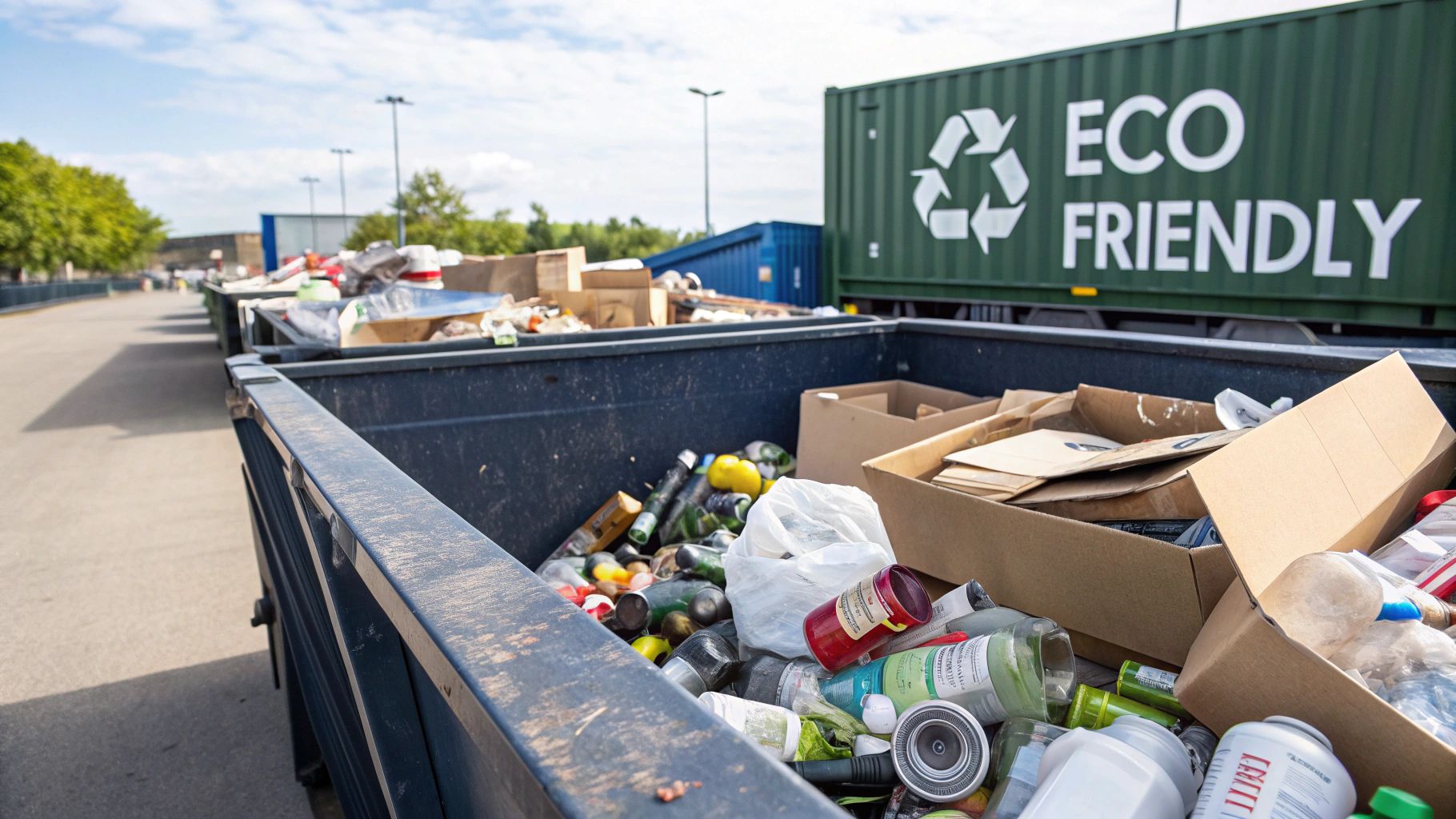
Logistics can genuinely make or break your skip hire experience. A smooth, on-time delivery gets your project started on the right foot, and a prompt collection keeps everything tidy and on schedule. It’s a simple concept, but poor service remains a massive issue across the UK skip hire industry.
It's pretty shocking, but research shows that around 68% of customers aren't happy with their skip hire service. Common complaints range from frustrating delivery delays and poor communication to collections that just never happen. In fact, delays alone mess up an estimated 43% of scheduled deliveries. You can read more about these common skip hire service problems here. A bit of planning can help you steer clear of these headaches.
Prepping for the Skip Lorry's Arrival
Honestly, a little prep work goes a long way. Spending ten minutes thinking about the delivery can save you a world of trouble when the lorry shows up. The main thing to consider is access. These skip lorries are big, heavy bits of kit and they need a decent amount of space to get in and out safely.
Before delivery day, do a quick walk-through of the route from the street to where you want the skip. You’re looking for a few key things:
- Enough Width: The gateway to your drive needs to be at least 3 metres (around 10 feet) wide. Any less and the driver will struggle.
- Clearance Above: Don't forget to look up. Low-hanging tree branches, pesky telephone wires, or even the eaves of your garage can get in the way of the lorry's lifting arm.
- A Firm Footing: The ground needs to be solid. A heavy lorry on soft grass, especially after a downpour, is a recipe for a churned-up lawn. Pavement or a solid drive is always best.
Also, think about your neighbours. Is someone likely to park their car right where the lorry needs to reverse? A quick, friendly chat the evening before can prevent a major delay on the day.
Picking the Perfect Spot
Where you put the skip matters just as much as getting it there. You want it somewhere convenient for you to load, but also practical for the driver to drop off and pick up. On your property, a driveway or another paved area is the ideal spot.
One thing I've seen go wrong countless times is damage to driveways. If you have nice block paving or a tarmac drive you want to protect, place some old wooden planks or scaffold boards down first. This helps to spread the weight of the skip and stops it from scratching or cracking the surface when it's lowered.
Pro Tip: If at all possible, be there for the delivery. It’s the easiest way to guide the driver to the exact spot you want, avoiding any mix-ups. If you absolutely can't be home, leave incredibly clear instructions or even mark the spot with a cone or a brick.
The Golden Rule of Filling a Skip
Once the skip is sitting pretty on your drive, it’s tempting to try and squeeze every last bit of rubbish in. But there's one crucial rule you can't ignore: do not overfill it.
Every skip has a maximum fill level, which is the top edge of its sides. This is what we call a 'level load'.
Piling waste high above the sides is a huge no-no. For starters, it’s incredibly dangerous for transport – things can easily fall off on the road. It’s also illegal. The driver will simply refuse to take an overloaded skip, leaving you with the hassle of emptying the excess and potentially facing extra fees for a wasted journey.
Your Top Skip Hire Questions Answered
To make sure everything goes off without a hitch, it helps to have a few key details sorted before you book. Here are the answers to some of the most common questions we get from customers hiring a skip in Christchurch.
How Long Can I Keep the Skip For?
The standard hire period for a skip in Christchurch is usually somewhere between 7 and 14 days. For most home clear-outs, garden makeovers, or small-scale renovations, that’s plenty of time.
Of course, we know that projects don't always run like clockwork. If you get the job done early, just give us a call and we can often arrange a sooner collection. On the other hand, if you need a bit more time, most good companies will let you extend the hire for a small daily or weekly fee. It’s always best to ask about the standard duration and any extension costs upfront to avoid any surprises on the final bill.
Do I Need to Be Home for the Delivery?
It’s not strictly mandatory, but we always recommend it. Being on-site when the lorry arrives means you can show the driver exactly where you want the skip placed. This is the single best way to prevent any accidental scrapes on your driveway or access problems.
If you absolutely can't be there, you’ll need to leave crystal-clear instructions. A great tip is to mark the spot with a cone, a couple of bricks, or even just by sending a quick photo to the hire company. For the collection, you generally don't need to hang around, as long as the skip is easy to get to and hasn't been overfilled.
Remember: You are legally responsible for everything that ends up in your skip. Being there for the drop-off and having it placed securely on your property is the best way to stop others from using it as a free-for-all.
What Happens to All My Waste?
Your skip doesn’t just get carted off to the nearest landfill. Any responsible skip provider will take your waste to a licensed transfer station for sorting. It’s a crucial step.
There, materials like wood, metal, soil, and hardcore are separated out to be recycled. The whole point is to divert as much rubbish from landfill as possible. It’s not just better for the environment; it’s a more cost-effective way to manage waste. Before you hire a skip in Christchurch, always check your provider has a valid Waste Carrier's Licence.
Can My Neighbours Use My Skip?
Well, they shouldn't without asking you first. But the reality is, once that skip is on your drive, you are responsible for whatever goes into it. If a neighbour chucks in something they shouldn't – like an old TV or a tin of paint – you could be the one facing extra charges for contamination.
Skips left on a public road are especially tempting targets. A simple but very effective trick is to cover it with a tarpaulin overnight, tied down with a few bungee cords. It’s a small effort that can save you a big headache later on.
For a reliable, no-fuss service, let The Waste Group take care of your project. We provide clear pricing, flexible hire options, and a genuine commitment to responsible waste disposal. Book your skip online or give our expert team a call today.
